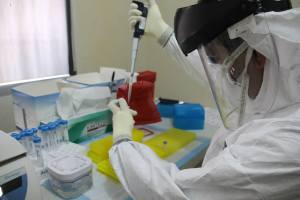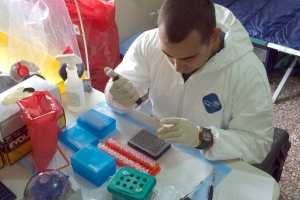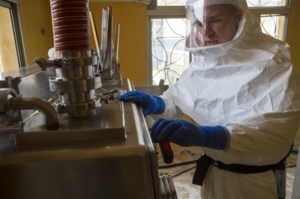These genetic tests cut time to answer from days to a few hours, reducing the risk of exposing non-infected patients and improving outcomes for Ebola patients
In response to the continuing outbreak of Ebola in the West African countries of Guinea, Liberia, and Sierra Leone, more attention has been given to medical laboratory testing in these countries, along with a rush to develop diagnostic tests that can detect Ebola faster and more accurately without the need for state-of-the art clinical laboratories that are uncommon in those nations.The lack of even limited basic services in the region, such as electricity, hinders any attempt to install modern diagnostic facilities and clinical laboratories essential to controlling and preventing further spread of the disease. Another issue is the lack of trained pathologists, Ph.Ds., and clinical laboratory scientists to staff such labs in those nations.
One solution to this challenge, however, is for developed nations to provide mobile medical laboratories and hospital facilities. Such resources have been contributed by the United States, Canada, and several European countries.
U.S. Navy High-Tech Mobile Lab Tests for RNA Unique to Ebola
The U.S. Navy now operates a high-tech diagnostics laboratory near the World Health Organization’s (WHO) Island Clinic in Monrovia, Liberia’s capitol. This deadly disease has hit the nation of Liberia hardest. Establishing the diagnostic lab there reduces time to answer an Ebola diagnosis from two-five days down to just three-five hours, noted a report published by WHO.
Since beginning operations last October, more than 500 blood samples have been processed by the lab at the time of this published report, half of which were Ebola positive. “The main goal of our job is to speed up the time between the arrival of the blood sample and the detection of the Ebola virus in the sample,” emphasized Ketan Patel, M.D., of the U.S. Naval Medical Research Center in Silver Spring, Maryland. Dr. Patel pointed out that a quick diagnosis minimizes the risk of exposing non-infected patients and improves outcomes for those infected.

Ketan Patel, M.D., extracts genetic material from a blood sample. He is one of three medical laboratory professionals who operate the U.S. Naval Medical Research Center’s high-tech medical laboratory in Monrovia, Liberia. This lab’s test process cuts time to diagnosing Ebola from two-five days to about three hours by identifying RNA in specimens that is unique to the Ebola virus. (Photo and caption copyright WHO/P. Desloovere)
Safety for Clinical Laboratory Personnel Is Top Priority
“The first thing we do with a blood sample is inactivate the Ebola virus, making the virus non-infectious and safer for testing,” stated U.S. Navy Lieutenant Jose Garcia, Ph.D., a microbiologist. To avoid direct blood contact with lab workers, specimens are processed in a portable biological safety hood.

U.S. Navy Lt. Jose Garcia, Ph.D., pipettes patient samples into a testing plate to test for Ebola at a Naval Medical Research Center mobile laboratory on Bushrod Island, Liberia. The center sent two mobile testing labs to Liberia. Each lab can test up to 80 samples per day. (Photo and caption copyright Jerrold Diederich/U.S. Army)
Since the Ebola virus is built of RNA, lab technicians extract all genetic material from the blood sample and look for RNA that is unique to the Ebola virus, explained Patel. To confirm presence of the virus, the lab uses polymerase chain reaction (PCR) technology, which can amplify a single RNA strand into millions of copies, to create enough RNA for the test.
Since these steps are performed in different areas of the labs, samples are safely moved from one room to another in small dunk tanks containing 10% chlorine bleach to avoid direct contact with lab workers. The lab can process up to 16 blood samples at a time in three hours, Patel said.
Hardest Hit by Ebola Deaths, Liberia Capitol Has Nine Mobile Medical Labs
Liberia has been hardest hit by Ebola, with 3,858 deaths from this deadly disease, compared to 3,363 deaths in Sierra Leone and 2,032 in Guinea, as of February 10, 2015, stated a Centers for Disease Control & Prevention (CDC) report.
A total of nine mobile labs are currently operating in and near Monrovia, the capitol of Liberia: seven by the Department of Defense (DoD), one by the CDC-National Institutes of Health (NIH), and one by European Union, according to a DoD News report.
Ebola Testing Labs in Zwedru Shutting Down
In February, the Maryland-based 1st Area Medical Laboratory (AML), which is part of the 20th CBRNE (Chemical, Biological, Radiological, Nuclear, Explosives) Command, began shutting down the Zwedru-based infectious-disease laboratory—the first of four Liberia-based Ebola testing laboratories scheduled for closure.

Capt. Shawn Palmer, a biochemist with the 1st Area Medical Laboratory, based out of Aberdeen Proving Ground, Md., and a native of Loma, Colo., breaks down a biological safety level three glove box at the 1st AML’s Ebola testing lab in Zwedru, Liberia. (Photo and caption copyright Joint Forces Command—United Assistance Public Affairs)
Since arriving in mid-October, 2014, the 1st AML “soldier-scientists,” as they are known, have processed more than 4,500 blood samples looking for Ebola. That mission is coming to an end. No Ebola has been detected for more than 90 days.
“Here at the Zwedru lab, we haven’t received any positive samples for Ebola, which is great for the people of this community,” said Capt. Shawn Palmer, a biochemist for the Zwedru lab in a Clarksville Online article, which was penned by Staff Sgt. Terrance D. Rhodes of the 101st Airborne Division (Air Assault).
In regards to the development of rapid tests for Ebola, just weeks ago, on February 26, the World Health Organization announced its approval of an Ebola test. It is manufactured by Corgenix Medical Corporation (OTCQB: CONX.OB), of Denver, Colorado. In its statement about the approval, WHO said that the Corgenix ReEBOV Antigen Rapid Test Kit uses a finger stick specimen and can return an answer in 15 minutes.
It is reported that the test costs about $15 and can identify 92% of infected individuals and 85% of uninfected individuals. The intent is to use this as a screening test and confirmation with a more specific diagnostic methodology is recommended.
These developments show how an event like the Ebola epidemic in West Africa plays a role in furthering the globalization of laboratory medicine. One element of this globalization is stronger ties between pathologists and medical laboratory technologists of developed nations with their counterparts in developing nations. Another element is the stimulus to accelerate the development of faster, more accurate, and inexpensive medical laboratory tests for use in these countries.
—by Patricia Kirk
Related Information:
USAID Administrator Praises DoD Effort in Ebola Fight
Liberia: New Ebola Mobile Lab Speeds Up Diagnosis and Improves Care
Canada Sending 3rd Lab to Help Ebola Fight
Laboratory Support Mission: Fighting Ebola in Guinea
Pentagon Opens Second Mobile Laboratory in Fight Against Ebola
Navy Scientist Serves as Front Line Ebola Fighter in Liberia
1st Area Medical Laboratory to Deploy for Ebola Mission
U.S. Soldier, Scientists Begin Closing Down Ebola Testing Labs in Liberia
Corgenix Receives FDA Authorization and WHO Listing for Emergency Use of Ebola Rapid Diagnostic Test




I commend this emergency effort. As a person who has been involved in building laboratory infrastructure in Africa with PEPFAR, my concern is that we are not addressing the fundamental need for laboratory and public health infrastructure in these countries. PEPFAR has addressed this need in certain African countries with high HIV burdens but the need for laboratory testing will exist beyond this epidemic into the next one. How do we assist in building true infrastructure for laboratory medicine there for the future? Thank you again.